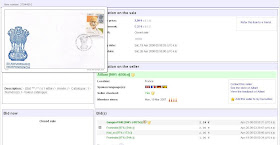Hello Gandhi Collectors,
Togo, is a country in West Africa bordered by Ghana to the west, Benin to the east and Burkina Faso to the north. It extends south to the Gulf of Guinea, on which the capital Lomé is located.
From the 11th to the 16th century, various tribes entered the region from all directions. From the 16th century to the 18th century, the coastal region was a major trading centre for Europeans in search of slaves, earning Togo and the surrounding region the name "The Slave Coast". In 1884, Germany declared Togoland a protectorate. After World War I, rule over Togo was transferred to France. Togo gained its independence from France in 1960. (Source :
Wikipedia).
In 1969, Togo honored Mahatma Gandhi with a set of a 2 stamps valued 30 and 90 CFA Franc. Along with Mahatma Gandhi they also honored George Washington, Albert Lutuli, Simon Bolivar, Friedrich Ebert with one stamp for each.
Not seen any official FDC but you can see private FDC of this stamps, but you need to make sure about authenticity of FDC.
In October 2011, set of 6 stamps was sold for $3.!! Amazing price after 40+ years, which tells that Gandhi stamps are not for investment.
Don't trust all the news articles which is mentioning that you should put some percentage of your investment in stamps.!! Think and research first about this investment. Compare it with Gold or even Stocks(Shares) and then if you think it's worth it then go for it.
Even with famous leaders from around the world this stamps in not appreciating.
You will see this stamps selling from $5 - $15 on delcampe or ebay so beware of pricing. So new collectors make sure about pricing before you buy this stamps.
Thanks
Ketankumar Patel.
Please read my following blog post and check out following images (to me it's a national joke) about following FAKE AND FORGED Gandhi stamps and philatelic cancellation.
************************************************
Following is brief information about other leaders. (Source : Wikipedia).
George Washington was the dominant military and political leader of the new United States of America from 1775 to 1799. He led the American victory over Great Britain in the American Revolutionary War as commander-in-chief of the Continental Army from 1775 to 1783, and presided over the writing of the Constitution in 1787. His leadership style established many forms and rituals of government that have been used since, such as using a cabinet system and delivering an inaugural address. Washington is universally regarded as the "Father of his Country".
Albert Lutuli was a South African teacher and politician. Lutuli was elected president of the African National Congress (ANC), at the time an umbrella organisation that led opposition to the white minority government in South Africa. He was awarded the 1960 Nobel Peace Prize for his role in the non-violent struggle against apartheid. He was the first African, and the first person from outside Europe and the Americas, to be awarded the Nobel Peace Prize.
Friedrich Ebert was a German politician of the Social Democratic Party of Germany (SPD). When Ebert was elected as the leader of the SPD after the death of August Bebel, the party members of the SPD were deeply divided because of the party's support for World War I. Ebert supported the Burgfrieden and tried to isolate the war opposers in the party. After the war and the end of the monarchy he served as the first President of Germany from 1919 until his death in office.
Simón Bolívar was a Venezuelan military and political leader. Together with José de San Martín, he played a key role in Hispanic-Spanish America's successful struggle for independence from the Spanish Empire, and is today considered one of the most influential politicians in Latin American history. Bolívar remains regarded in Hispanic-America as a hero, visionary, revolutionary, and liberator. During his lifetime, he led Colombia, Venezuela, Ecuador, and Bolivia to independence, and helped lay the foundations for democratic ideology in much of Latin America.












































